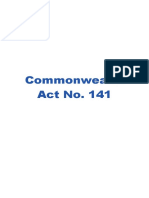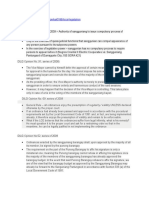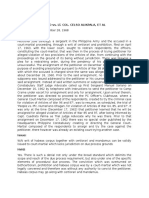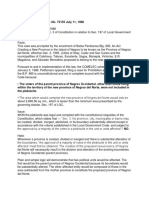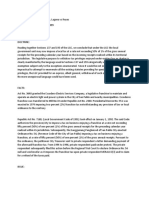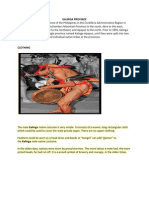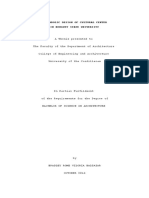Salva V Makalintal
Salva V Makalintal
Uploaded by
CybelShepheredSarolMalagaCopyright:
Available Formats
Salva V Makalintal
Salva V Makalintal
Uploaded by
CybelShepheredSarolMalagaOriginal Description:
Original Title
Copyright
Available Formats
Share this document
Did you find this document useful?
Is this content inappropriate?
Copyright:
Available Formats
Salva V Makalintal
Salva V Makalintal
Uploaded by
CybelShepheredSarolMalagaCopyright:
Available Formats
SALVA vs.
MAKALINTAL
G.R. No. 132603 (September 8, 2000)
FACTS:
The petitioners filed with the RTC a class suit against the Sangguniang Panglalawigan of
Batangas, Sangguniang Pambayan of Calaca, Batangas, and the Commission on Elections
(COMELEC) for annulment of Ordinance No. 05 and Resolution No. 345 both enacted by the
Sangguniang Panglalawigan of Batangas, and COMELEC Resolution No. 2987. Ordinance No. 05
declared the abolition of Barangay San Rafael and its merger with Barangay Dacanlao,
Municipality of Calaca, Batangas and accordingly instructed the COMELEC to conduct the
required plebiscite. Resolution No. 345 affirmed the effectivity of Ordinance No. 05, thereby
overriding the veto exercised by the governor of Batangas. Ordinance No. 05 was vetoed by the
Governor of Batangas for being ultra vires, particularly, as it was not shown that the essential
requirements regarding the attestations or certifications of several government agencies were
obtained. The COMELEC promulgated Resolution No. 2987, providing for the rules and
regulations governing the conduct of the required plebiscite scheduled on February 28, 1998, to
decide the issue of the abolition of barangay San Rafael and its merger with barangay Dacanlao,
Calaca, Batangas. The trial court denied the petition saying that any petition or action
questioning an act, resolution or decision of the COMELEC must be brought before the
Supreme Court. The petitioners contend that when the COMELEC exercises its quasi-judicial
functions under Section 52 of the Omnibus Election Code, its acts are subject to the exclusive
review by this Court; but when the COMELEC performs a purely ministerial duty, such act is
subject to scrutiny by the Regional Trial Court. Petitioners submit that the conduct of a
plebiscite, pursuant to Ordinance No. 05 and Resolution No. 345, is not adjudicatory or quasi-
judicial in nature but simply ministerial or administrative in nature and only in obedience to the
aforesaid Ordinance and Resolution.
ISSUE:
Whether or not the respondent court has jurisdiction to enjoin the comelec from
implementing its resolution no. 2987, series of 1998, which provided for the rules and
regulations for the conduct of the plebiscite scheduled on february 28, 1998 to decide on the
abolition of barangay san rafael and its merger with barangay dacanlao, calaca, batangas,
pending the determination of civil case no. 3442 for the annulment of ordinance no. 05,
resolution no. 345 and comelec resolution no. 2987.
HELD:
Section 7, Article IX-A of the 1987 Constitution provides in part that: SEC. 7. xxx. Unless
otherwise provided by this Constitution or by law, any decision, order, or ruling of each
Commission may be brought to the Supreme Court on certiorari by the aggrieved party within
thirty days from receipt of a copy thereof.
The Court ruled that What is contemplated by the term final orders, rulings and
decisions of the COMELEC reviewable by certiorari by the Supreme Court as provided by law
are those rendered in actions or proceedings before the COMELEC and taken cognizance of by
the said body in the exercise of its adjudicatory or quasi-judicial powers. Briefly, COMELEC
Resolution No. 2987 which provides for the rules and regulations governing the conduct of the
required plebiscite, was not issued pursuant to the COMELECs quasi-judicial functions but
merely as an incident of its inherent administrative functions over the conduct of plebiscites,
thus, the said resolution may not be deemed as a final order reviewable by certiorari by this
Court. Any question pertaining to the validity of said resolution may be well taken in an
ordinary civil action before the trial courts.
MONTEBON vs. COMMISSION ON ELECTIONS
G.R No. 180444 April 8, 2008
FACTS:
Petitioners Montebon and Ondoy, and respondent Potencioso, Jr. were candidates for
municipalcouncilor of the Municipality of Tuburan, Cebu. Petitioners filed a petition for
disqualification against respondent with the Commission on Election (COMELEC) alleging that
respondent had been elected and served three consecutive terms as municipal councillor.
Respondent admitted that he had been elected for three consecutive terms but argued that the
service of his second term was interrupted when he succeeded as vice mayor of Tuburan due to
the retirement of the current vice mayor. Petitioner further alleges that the respondents
assumption of office should not be considered an interruption in the service since it was a
voluntary renunciation of his office. COMELEC denied the petition and ruled in favour of the
respondent, hence the petition for certiorari.
ISSUE:
Whether or not the respondents assumption of office as vice mayor interrupted his
second term as municipal councillor.
HELD:
Succession in Local Government offices is by operation of law. Section 44 of Republic Act
7160 (RA 7160), otherwise as the Local Government Code, provides that if a permanent vacancy
occurs in the office of the vice mayor, the highest ranking sangguniang member shall become
vice mayor. It is clear therefore that his assumption of office cannot be voluntary renunciation
of his office. In Lonzanida vs. COMELEC provides by law amounts to an interruption of
continuity of services. The Supreme Court quotes with approval the ruling of the COMELEC that:
The legal successor is not given any option under the law on whether to accept the vacated
post or not. Section 44 of the Local Government Code makes no exceptions. Succession by law
to a vacated government office is characteristically not voluntary since it involves the
performance of a public duty by government official, it is therefore more compulsory and
obligatory rather that voluntary.
ORDILLO vs. COMMISSION ON ELECTIONS
G.R. No. 93054 December 4, 1990
FACTS:
On January 30, 1990, the people of the provinces of Benguet, Mountain Province,
Ifugao, Abra and Kalinga-Apayao and the city of Baguio cast their votes in a plebiscite held
pursuant to Republic Act No. 6766 entitled An Act Providing for an Organic Act for the
Cordillera Autonomous Region. The official Commission on Elections (COMELEC) results of the
plebiscite showed that the creation of the Region was approved by a majority of 5,889 votes in
only the Ifugao Province and overwhelmingly rejected by 148, 676 votes in the rest of the
provinces and city above-mentioned. On February 14, 1990, the COMELEC issued Resolution
No. 2259 stating that the Organic Act for the Region has been approved and/or ratified by
majority of votes cast only in the province of Ifugao. The Secretary of Justice also issued a
memorandum for the President reiterating COMELEC resolution. As a result, Congress enacted
Republic Act No. 6861 setting elections in the CAR of Ifugao on first Monday of March 1991.
Even before the COMELEC resolution, Executive Secretary issued on February 5, 1990, a
memorandum granting authority to wind up the affairs of the Cordillera Executive Board and
the Cordillera Regional Assembly created under Executive Order No. 220. The petitioner then
filed a petition with the COMELEC to declare the non-ratification of the Organic Act for the
Region but it was merely noted by the COMELEC. On March 30, 1990, the President issued
Administrative Order No. 160 declaring among others that the Cordillera Executive Board and
Cordillera Regional Assembly and all the offices created under Executive Order No. 220 were
abolished in view of the ratification of the Organic Act. The Petitioners maintain that there can
be no valid Cordillera Autonomous Region in only one province as the Constitution and
Republic Act No. 6766 require that the said Region be composed of more than one constituent
unit. Petitioners, then, pray that the court: (1) declare null and void COMELEC Resolution No.
2259, the memorandum of the Secretary of Justice, the memorandum of the Executive
Secretary, Administrative Order No. 160, and Republic Act No. 6861 and prohibit and restrain
the respondents from implementing the same and spending public funds for the purpose and
(2) declare Executive Order No.220 to be still in force and effect until another organic law for
the Autonomous Region shall have been enacted by Congress and the same is duly ratified by
the voters in the constituent units.
ISSUE:
Whether or not the province of Ifugao, being the only province which voted favourably
for the creation of the Cordillera Autonomous Region can, alone, legally and validly constitute
such Region.
HELD:
It is explicit in Article X, Section 15 of the 1987 Constitution that there shall be created
autonomous regions in Muslim Mindanao and in the Cordillera consisting of provinces, cities,
municipalities and geographical areas sharing common and distinctive historical and cultural
heritage, economic and social structures, and other relevant characteristics within the
framework of this Constitution and the national sovereignty as well as territorial integrity of the
Republic of the Philippines. The keywords-provinces, cities, municipalities and geographical
areas connote that region is to be made up of more than one constituent unit. The term
region used in its ordinary sense means two or more provinces.
In the present case, Ifugao is a province alone by itself. To become part of a region, it
must join other provinces, cities, municipalities, and geographical areas. It joins other units
because of their common and distinctive historical and cultural heritage, economic and social
structures and other relevant characteristics. The Constitutional requirements are not present
in the case. As such, the Court ruled that the sole province of Ifugao cannot validly constitute
the cordillera Autonomous Region.
MATIBAG vs. BENIPAYO
G.R. No. 149036 April 2, 2002
FACTS:
The Commission on Elections (COMELEC) en banc appointed petitioner as Acting
Director IV of the EID. Such appointment was renewed in temporary capacity twice, first by
Chairperson Demetrio and then by Commissioner Javier. Later, President Gloria Macapagal-
Arroyo (PGMA) appointed, ad interim, Benipayo as COMELEC Chairman, and Borra and Tuason
as COMELEC Commissioners, each for a term of seven (7) years. The three (3) took their oaths
of office and assumed their positions. However, since the Commission on Appointments did not
act on said appointments, PGMA renewed the ad interim appointments.
ISSUES:
a. Whether or not the assumption of office by Benipayo, Borra and Tuason on the basis of
ad interim appointments issued by the President amounts to a temporary appointment
prohibited by Section 1(2), Article IX-C of the 1987 Constitution.
b. Assuming that the first ad interim appointments and the first assumption of office by
Benipayo, Borra and Tuason are legal, whether or not the renewal of their ad interim
appointments and subsequent assumption of office to the same positions violate the
prohibitions on reappointment under Section 1(2) Article IX-C of the 1987 Constitution.
HELD:
a. An ad interim appointment is a permanent appointment because it takes effect
immediately and can no longer be withdrawn by the President once the appointee has
qualified into office. The fact that it is subject to confirmation by the Commission on
Appointments does not alter its permanent character. The Constitution itself makes
an ad interim appointment permanent in character by making it effective until
disapproved by the Commission on Appointments or until the next adjournment of
Congress. The second paragraph of Section 16, Article VII of the Constitution provides:
The President shall have the power to make appointments during the recess of the
Congress, whether voluntary or compulsory, but such appointments shall be effective
only until disapproval by the Commission on Appointments or until the next
adjournment of the Congress. In fine, the Court rule that the ad interim appointments
extended by the President to Benipayo, Borra and Tuason, as COMELEC Chairman and
Commissioners, respectively, do not constitute temporary or acting appointments
prohibited by Section 1 (2), Article IX-C of the Constitution.
b. The ad interim appointments and subsequent renewals of appointments of Benipayo,
Borra and Tuason do not violate the prohibition on reappointments because there were
no previous appointments that were confirmed by the Commission on Appointments. A
reappointment presupposes a previous confirmed appointment. The same ad interim
appointments and renewals of appointments will also not breach the seven-year term
limit because all the appointments and renewals of appointments of Benipayo, Borra
and Tuason are for a fixed term expiring on February 2, 2008.[63] Any delay in their
confirmation will not extend the expiry date of their terms of office. Consequently,
there is no danger whatsoever that the renewal of the ad interim appointments of these
three respondents will result in any of the evils intended to be exorcised by the twin
prohibitions in the Constitution. The continuing renewal of the ad interim appointment
of these three respondents, for so long as their terms of office expire on February 2,
2008, does not violate the prohibition on reappointments in Section 1 (2), Article IX-C of
the Constitution.
LIBARDOS vs. CASAR
A.M. No. MTJ-92-728 July 8, 1994
FACTS:
A sworn complaint, dated 27 October 1992, was filed before this court by complainant,
Mayor Perlita P. Libardos of Maigo, Lanao del Norte, against respondent Judge Abdullah M.
Casar of the Municipal Circuit Trial Court (MCTC), Kolambugan-Maigo, Lanao del Norte, for
gross ignorance of the law, grave misconduct, arbitrariness and conduct unbecoming a judge.
The complaint is an offshoot of an order dated 14 May 1992 in Special Proceedings No. 19,
issued by respondent restraining the Commission on Elections (COMELEC) Board of Canvassers
of Maigo, Lanao del Norte, from canvassing the election returns of Precinct No. 10-A until either
the COMELEC or the Regional Trial Court in Iligan City could act on the petition of Wilfredo P.
Randa, a mayoralty candidate of the Nationalist People's Coalition (NPC). In compliance with
the Court's resolution dated 2 February 1993, respondent submitted his Comment dated 17
March 1993. On 23 November 1993, the Court referred this case to the Office of the Court
Administrator for evaluation, report and recommendation. The report of the Court
Administrator states that they find for the complainant. By and large, the Court agrees with the
conclusions of the Court Administrator.
ISSUE:
Whether or not respondent acted with grave abuse of discretion in issuing his Order
dated May 14, 1992 ordering the Board of Canvassers of Maigo, Lanao del Norte to suspend the
canvassing of the election returns knowing full well that he does not have jurisdiction to act on
the petition filed by Wilfredo Randa.
HELD:
The Court ruled and find respondent's actuation as unbecoming that of a worthy Judge,
for a judge should be faithful to the law and maintain professional competence (Rule 3.01,
Canon 3, Code of Judicial Conduct). While his reasons for issuing the assailed order are perhaps
commendable and demonstrative of his concern for peace and order during the election period
in the given community, he lost sight of his bounden duty, as a Judge, to be the embodiment of
competence, integrity, and independence (Rule 1.01, Canon 1). Judge should behave at all
times as to promote public confidence in the integrity and impartiality of the judiciary (Rule
2.01, Canon 2). The Court RESOLVED to hold respondent judge administratively liable for having
knowingly issued an order without jurisdiction and with grave abuse of discretion.
ABES vs. COMMISSION ON ELECTION
G.R. No. L-28348 December 15, 1967
FACTS:
Petitioners' cry for relief, so their petition avers, is planted upon the constitutional mandate of
free, orderly, and honest elections.
Petitioners, candidates of the Liberal Party, the Nacionalista
Reform Party and the Quezon City Citizens League for Good Government, first went to the
Commission on Elections (COMELEC). Upon the claim that more than 50% of the registered
voters were not able to vote during the elections of November 14, 1967, they prayed for
COMELEC's declaration that there was failure of election. They petitioned for suspension of the
canvass and the proclamation of winning candidates. They sought nullification, too, of elections
in Quezon City for city officials and asked that new elections be held. COMELEC, in a minute
resolution of November 23, 1967, denied the petition, ordered the board of canvassers to
proceed with the canvass but not to proclaim any winning candidate for city offices and gave
petitioners time "to go to the Supreme Court for the proper remedy."
Petitioners thus came to
this Court on certiorari with a prayer for preliminary injunction.
ISSUES:
a. Whether COMELEC has jurisdiction to order the board of canvassers to suspend the
canvassing and proclamation of the, winning candidates;
b. Whether COMELEC has to annul the elections in Quezon City; and
c. Whether COMELEC has following such annulment, to direct the holding of another
election.
HELD:
1. The board of canvassers is a ministerial body. It is enjoined by law to canvass all votes on
election returns submitted to it in due form. COMELEC is the constitutional body charged with
the duty to enforce all laws relative to elections, duty bound to see to it that the board of
canvassers perform its proper function. It is within the legitimate concerns of COMELEC to
annul a canvass or proclamation based on incomplete returns,
or on incorrect or tampered
returns; annul a canvass or proclamation made in an unauthorized meeting of the board of
canvassers either because it lacked a quorum or because the board did not meet at all.
the first, from performing its constitutional and legal duty to administer the election laws and
supervise elections; and the second, from discharging its legal obligation to canvass the returns
and proclaim the elected candidates. And worse, to suspend canvassing and proclamation at
this late date may result in a vacuum in office of Quezon City elective officials after the term of
the present incumbents shall have ended on December 31, 1967. Some such eventuality must
be prevented. Canvassing and proclamation must proceed.
You might also like
- Benguet HeritageDocument29 pagesBenguet HeritageSheena Organo Gawiden100% (3)
- Katutubong Awit (Native Song)Document10 pagesKatutubong Awit (Native Song)Jose Brabante86% (7)
- Salva v. Makalintal - Sahali v. COMELECDocument6 pagesSalva v. Makalintal - Sahali v. COMELECMariaAyraCelinaBatacanNo ratings yet
- 98 99Document3 pages98 99Bar2012No ratings yet
- Contemporary Arts From CAR (Cordillera Administrative Region)Document40 pagesContemporary Arts From CAR (Cordillera Administrative Region)Jan Maverick Agbunag92% (26)
- Portfolio in HM 211Document20 pagesPortfolio in HM 211Dia Camille50% (2)
- Municipality of Kananga vs. MadronaDocument2 pagesMunicipality of Kananga vs. MadronaBenneth SantoluisNo ratings yet
- National Liga NG Mga Barangay vs. Paredes Class NotesDocument6 pagesNational Liga NG Mga Barangay vs. Paredes Class NotesOnnie LeeNo ratings yet
- Sangguniang Brgy v. MartinezDocument3 pagesSangguniang Brgy v. MartinezKarla BeeNo ratings yet
- Southern Luzon State UniversityDocument2 pagesSouthern Luzon State UniversityEljoy AgsamosamNo ratings yet
- Local LegislationDocument227 pagesLocal LegislationCheska Christiana Villarin SaguinNo ratings yet
- National Liga NG Mga Barangay v. Paredes DigestDocument6 pagesNational Liga NG Mga Barangay v. Paredes DigestArnold Rosario ManzanoNo ratings yet
- Subic Bay v. COMELEC G.R. No. 125416 FactsDocument3 pagesSubic Bay v. COMELEC G.R. No. 125416 FactsJessie Albert CatapangNo ratings yet
- V. F. 3. La Carlota City vs. RojoDocument3 pagesV. F. 3. La Carlota City vs. RojoLiezl Oreilly VillanuevaNo ratings yet
- Purok Ordinance 2023Document9 pagesPurok Ordinance 2023barangaypatadon1974No ratings yet
- Juliet Dano V Comelec and Digal - Case DigestDocument3 pagesJuliet Dano V Comelec and Digal - Case DigestAnonymous lokXJkc7l7No ratings yet
- Sema V ComelecDocument3 pagesSema V ComelecDenDen GauranaNo ratings yet
- Quisumbing Vs Garcia NotesDocument3 pagesQuisumbing Vs Garcia Notesanna reham lucmanNo ratings yet
- Angobung Vs ComelecDocument3 pagesAngobung Vs Comeleckayelaurente100% (1)
- Full Disclosure PolicyDocument10 pagesFull Disclosure Policy8LYN LAWNo ratings yet
- Republic vs. LazoDocument7 pagesRepublic vs. Lazohmn_scribdNo ratings yet
- Commonwealth Act NoDocument21 pagesCommonwealth Act NoGepcars FlouramieNo ratings yet
- Dumpit-Michelena Vs BoadoDocument2 pagesDumpit-Michelena Vs BoadoElyn ApiadoNo ratings yet
- Boracay CaseDocument2 pagesBoracay CaseAiza OrdoñoNo ratings yet
- Joseph C. Dimapilis v. COMELECDocument2 pagesJoseph C. Dimapilis v. COMELECjorem matayabas100% (1)
- SEC v. Universal Rightfield Property Holdings, Inc., G.R. No. 181381Document12 pagesSEC v. Universal Rightfield Property Holdings, Inc., G.R. No. 181381Rhenfacel Manlegro100% (1)
- Barrientos v. DaarolDocument4 pagesBarrientos v. DaarolRamon T. Conducto IINo ratings yet
- Stop The Spit! Stop The Spread of Infection! Act of MagsaysayDocument2 pagesStop The Spit! Stop The Spread of Infection! Act of MagsaysayAlfredo BaulaNo ratings yet
- Dumpit Michelena Vs BoadoDocument3 pagesDumpit Michelena Vs BoadoJohn Soliven100% (1)
- Calanza vs. PicopDocument3 pagesCalanza vs. PicopCarlos JamesNo ratings yet
- Province of Batangas Vs Romulo DigestDocument3 pagesProvince of Batangas Vs Romulo DigestBembo Bob Tiana TaytayNo ratings yet
- Local LegislationDocument2 pagesLocal LegislationRALSTON TUYOKNo ratings yet
- THE PROVINCE OF NEGROS OCCIDENTAL Vs CommissionersDocument3 pagesTHE PROVINCE OF NEGROS OCCIDENTAL Vs CommissionersJu LanNo ratings yet
- Municipal Board of Canvassers of Glan VDocument2 pagesMunicipal Board of Canvassers of Glan Vbablatin100% (2)
- Lina Vs Carino 221 SCRA 515Document13 pagesLina Vs Carino 221 SCRA 515Marianne Shen PetillaNo ratings yet
- 031 Calanza v. PICOPDocument3 pages031 Calanza v. PICOPthornapple25No ratings yet
- M1S2 SK History and Salient Features 2023.09.25Document67 pagesM1S2 SK History and Salient Features 2023.09.25Binson GibbNo ratings yet
- Aklat Asosasyon DigestDocument2 pagesAklat Asosasyon DigestRussel GarciaNo ratings yet
- Tolentino v. ComelecDocument2 pagesTolentino v. ComelecTen LaplanaNo ratings yet
- Boracay Foundation v. Province of AklanDocument3 pagesBoracay Foundation v. Province of AklanGabrielle Adine Santos100% (2)
- Baculi v. Office of The PresidentDocument3 pagesBaculi v. Office of The PresidentBryan Kylle LoNo ratings yet
- Moreno V Comelec DigestDocument3 pagesMoreno V Comelec DigestJien Lou100% (3)
- Heirs of Alberto Suguitan vs. City of MandaluyongDocument4 pagesHeirs of Alberto Suguitan vs. City of MandaluyongShaila Villavert100% (1)
- SERGIO G. AMORA, JR. v. COMMISSION ON ELECTIONS and ARNIELO S. OLANDRIADocument2 pagesSERGIO G. AMORA, JR. v. COMMISSION ON ELECTIONS and ARNIELO S. OLANDRIAGale Charm SeñerezNo ratings yet
- City of Pasig v. COMELECDocument2 pagesCity of Pasig v. COMELECKevin Hernandez100% (1)
- Sarangani V COMELEC DigestDocument1 pageSarangani V COMELEC DigestOnnie LeeNo ratings yet
- Ignacia Balicas vs. Fact-Finding and Intelligence Bureau G.R. No. 145972, March 23, 2004Document2 pagesIgnacia Balicas vs. Fact-Finding and Intelligence Bureau G.R. No. 145972, March 23, 2004Rizchelle Sampang-ManaogNo ratings yet
- Fernandez V Comelec and Rodriguez DigestDocument2 pagesFernandez V Comelec and Rodriguez DigestBAROPSNo ratings yet
- Appointive Officials Not Deemed Resigned Upon Filing of CoCDocument3 pagesAppointive Officials Not Deemed Resigned Upon Filing of CoChaze_toledo5077No ratings yet
- Socrates vs. COMELECDocument3 pagesSocrates vs. COMELECKristine JoyNo ratings yet
- Atienza Vs VillarosaDocument2 pagesAtienza Vs VillarosaRobert Ross DulayNo ratings yet
- Velayo FongDocument2 pagesVelayo FongMulberry Hernandez RazNo ratings yet
- Laceda vs. Limena DigestDocument1 pageLaceda vs. Limena DigestAlfred BryanNo ratings yet
- Dimapilis V COMELECDocument1 pageDimapilis V COMELECMigs GayaresNo ratings yet
- Santiago v. Alikpala, 25 SCRA 356 (1968)Document8 pagesSantiago v. Alikpala, 25 SCRA 356 (1968)Karen Patricio LusticaNo ratings yet
- Tan v. ComelecDocument2 pagesTan v. ComelecElise Rozel DimaunahanNo ratings yet
- Crisostomo vs. Court of Appeals, 258 SCRA 134 (1996)Document1 pageCrisostomo vs. Court of Appeals, 258 SCRA 134 (1996)claire beltranNo ratings yet
- Aratea vs. Comelec and Antipolo: Correccional As Minimum, To 8 Years and 1 DayDocument4 pagesAratea vs. Comelec and Antipolo: Correccional As Minimum, To 8 Years and 1 DayAnonymous 5MiN6I78I0No ratings yet
- Saligumba Vs PalanogDocument3 pagesSaligumba Vs PalanogJerome LeañoNo ratings yet
- Municipality of CorellaDocument6 pagesMunicipality of CorellaChairmaine Jacqueline PaulinoNo ratings yet
- 3abolition Salva vs. MakalintalDocument10 pages3abolition Salva vs. MakalintalthekhaleesithecatNo ratings yet
- 5.1 Fundamental State Principles and PoliciesDocument19 pages5.1 Fundamental State Principles and PoliciesAlmazan RockyNo ratings yet
- UMALI vs. COMELECG.R. No. 203974Document8 pagesUMALI vs. COMELECG.R. No. 203974Lina DiazNo ratings yet
- Admin and Election Laws Case Digest March 5Document13 pagesAdmin and Election Laws Case Digest March 5Jay R CristobalNo ratings yet
- City Government of San Pablo, Laguna Vs Reyes DegestDocument2 pagesCity Government of San Pablo, Laguna Vs Reyes DegestCybelShepheredSarolMalaga100% (1)
- Abnormal Psychology: Clear Up The Obvious: What Is Abnormal Psychology?Document34 pagesAbnormal Psychology: Clear Up The Obvious: What Is Abnormal Psychology?CybelShepheredSarolMalagaNo ratings yet
- Family Code CasesDocument4 pagesFamily Code CasesCybelShepheredSarolMalagaNo ratings yet
- Valenzuela Vs UnsonDocument59 pagesValenzuela Vs UnsonCybelShepheredSarolMalagaNo ratings yet
- Valenzuela Vs UnsonDocument59 pagesValenzuela Vs UnsonCybelShepheredSarolMalagaNo ratings yet
- Kalinga ProvinceDocument13 pagesKalinga ProvinceAubrey Pagal100% (1)
- Sociological Perspectives: (Henslin, 2010)Document97 pagesSociological Perspectives: (Henslin, 2010)MeikaelaJoy AboyNo ratings yet
- PROFESSIONAL TEACHER - Secondary (Technology Livelihood, Tech-Voc Education) - Baguio - 3-2023Document41 pagesPROFESSIONAL TEACHER - Secondary (Technology Livelihood, Tech-Voc Education) - Baguio - 3-2023PRC BaguioNo ratings yet
- GE Elec 11 Worktext - Indigenous Creative Crafts With Emphasis On Cordilleran Cultural HeritageDocument41 pagesGE Elec 11 Worktext - Indigenous Creative Crafts With Emphasis On Cordilleran Cultural Heritagezunigaclifford13100% (1)
- P.E. ReviewerDocument4 pagesP.E. Reviewerfelize padllaNo ratings yet
- PSHS 00 F RPA 16 Ver02 Rev0 NCE Application FormDocument1 pagePSHS 00 F RPA 16 Ver02 Rev0 NCE Application FormHazel Faye Bagunu100% (1)
- For Friday ThesisDocument20 pagesFor Friday ThesisBradley Rome Viloria BaltazarNo ratings yet
- Mass Induction TRDocument10 pagesMass Induction TRkristalynalcagno17No ratings yet
- Green Simple Photo Lawn and Garden Care Trifold BrochureDocument2 pagesGreen Simple Photo Lawn and Garden Care Trifold BrochureJohanne K. AtiwNo ratings yet
- Civil Service ReviewDocument8 pagesCivil Service ReviewGlenn Vincent Octaviano GuanzonNo ratings yet
- Rso GSTDocument2 pagesRso GSTMCCTNo ratings yet
- DepEd FAQ GAS 1Document46 pagesDepEd FAQ GAS 1Zedannreh SiracNo ratings yet
- Benguet PCIPDocument44 pagesBenguet PCIPhumayriNo ratings yet
- Tattoo PDFDocument85 pagesTattoo PDFJasmin Baruzo100% (1)
- Certificate AchieverDocument13 pagesCertificate AchieverCyril Jane B. OlsimNo ratings yet
- 2 Website Ra-Certified Public Accountant - Baguio - 10-2024 - WatermarkDocument58 pages2 Website Ra-Certified Public Accountant - Baguio - 10-2024 - WatermarkCzarina LopezNo ratings yet
- MANUSCRIPT CARASI FINALnaDocument23 pagesMANUSCRIPT CARASI FINALnaNcip Ilocos NorteNo ratings yet
- Underutilized Plant Resources in Tinoc, Ifugao, Cordillera Administrative Region, Luzon Island, PhilippinesDocument15 pagesUnderutilized Plant Resources in Tinoc, Ifugao, Cordillera Administrative Region, Luzon Island, Philippinespepito manalotoNo ratings yet
- CPAR Module 02 Nationwide and LuzonDocument39 pagesCPAR Module 02 Nationwide and LuzonRicardo JoserNo ratings yet
- Certificate Coronation 2023-2024Document16 pagesCertificate Coronation 2023-2024Jheun LictawaNo ratings yet
- Statistical Tables For The Summary Inflation Report (2018 100) For All Income CPI For June 2022 - d5s7rDocument37 pagesStatistical Tables For The Summary Inflation Report (2018 100) For All Income CPI For June 2022 - d5s7rClark Jeff CaluloNo ratings yet
- Activities in MusicDocument24 pagesActivities in MusicVanelyn GlobioNo ratings yet
- Baguio Museum - Home of Baguio's Cultural & Historical Heritage - Philippine PrimerDocument14 pagesBaguio Museum - Home of Baguio's Cultural & Historical Heritage - Philippine PrimerCherrie PedritoNo ratings yet
- BAGUIO of My HeartDocument6 pagesBAGUIO of My HeartDanilovaRamirezMolintasNo ratings yet
- Cpa 10-2022Document65 pagesCpa 10-2022PRC BaguioNo ratings yet
- Local Government Law Digest CompilationDocument483 pagesLocal Government Law Digest CompilationMike LlamasNo ratings yet





















